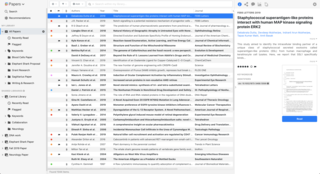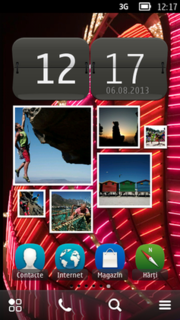External links
| This Macintosh-related article is a stub. You can help Wikipedia by expanding it. |
| Developer(s) | Apple Inc. |
|---|---|
| Stable release | 5.1 / 2009 |
| Operating system | Mac OS X |
| License | Proprietary |
| Website | Mac OS X Website |
Conflict Resolver is an application used by Apple's sync services. Data can be synced between services like MobileMe and Gmail to devices like Macs, PCs, and mobile devices. The sync services are utilized by several applications including Address Book, iCal, Mail. Conflict Resolver is executed in the event that a sync service cannot decide on which version of the data to use, creating a conflict. The user is prompted to choose which version of the data to use (MobileMe or local) and whether the user wishes to apply the same changes to all conflicts or review them individually.
Conflict Resolver resides at:
/System/Library/PrivateFrameworks/SyncServicesUI.framework/Versions/A/Resources/Conflict Resolver.app in versions of Mac OS X since 10.5. In Mac OS X 10.4, the application was located at /System/Library/CoreServices/Conflict Resolver.app.
| This Macintosh-related article is a stub. You can help Wikipedia by expanding it. |

Microsoft Office, or simply Office, is a family of client software, server software, and services developed by Microsoft. It was first announced by Bill Gates on August 1, 1988, at COMDEX in Las Vegas. Initially a marketing term for an office suite, the first version of Office contained Microsoft Word, Microsoft Excel, and Microsoft PowerPoint. Over the years, Office applications have grown substantially closer with shared features such as a common spell checker, OLE data integration and Visual Basic for Applications scripting language. Microsoft also positions Office as a development platform for line-of-business software under the Office Business Applications brand. On July 10, 2012, Softpedia reported that Office was being used by over a billion people worldwide.
Carbon is one of Apple’s C-based application programming interfaces (APIs) for macOS, the operating system that powers Macintosh computers. Carbon provided a good degree of backward compatibility for programs that ran on Mac OS 8 and 9. Developers could use the Carbon APIs to port their “classic” Mac software to the Mac OS X platform with little effort, compared to porting the app to the entirely different Cocoa system, which originated in OPENSTEP.
In computing, cross-platform software is computer software that is implemented on multiple computing platforms. Cross-platform software may be divided into two types; one requires individual building or compilation for each platform that it supports, and the other one can be directly run on any platform without special preparation, e.g., software written in an interpreted language or pre-compiled portable bytecode for which the interpreters or run-time packages are common or standard components of all platforms.

Microsoft Outlook is a personal information manager from Microsoft, available as a part of the Microsoft Office suite. Though primarily an email client, Outlook also includes such functions as calendaring, task managing, contact managing, note-taking, journal logging, and web browsing.
Apple Mail is an email client included by Apple Inc. with its operating systems macOS, iOS and watchOS. Apple Mail grew out of NeXTMail, which was originally developed by NeXT as part of its NeXTSTEP operating system, after Apple's acquisition of NeXT in 1997.

Calendar is a personal calendar app made by Apple Inc. that runs on both the macOS desktop operating system and the iOS mobile operating system. It offers online cloud backup of calendars using Apple's iCloud service, or can synchronize with other calendar services, including Google Calendar and Microsoft Exchange Server.

iSync is a software application first released by Apple Inc. on Jan 2, 2003. Apple licensed the core technology from fusionOne. It ran only under Mac OS X and was used to synchronize contact and calendar data from Address Book and iCal with many non-Apple SyncML-enabled mobile phones via a Bluetooth or USB connection. Support for many devices was built-in, with newer devices being supported via manufacturer and third-party iSync Plugins. Support for Palm OS organizers and compatible smartphones was removed with the release of iSync 3.1 and Mac OS X 10.6 Snow Leopard. BlackBerry OS, Palm OS, and Windows Mobile devices could not be used with iSync, but were supported by third-party applications. Before the release of Mac OS X 10.4, iSync also synchronized a user's Safari bookmarks with the then .Mac subscription service provided by Apple.

Windows Live Mesh was a free-to-use Internet-based file synchronization application by Microsoft designed to allow files and folders between two or more computers to be in sync with each other on Windows and Mac OS X computers or the Web via SkyDrive. Windows Live Mesh also enabled remote desktop access via the Internet.

Papers is a reference management software for Mac OS X and Windows, used to manage bibliographies and references when writing essays and articles. It is primarily used to organize references and maintain a library of PDF documents and also provides a uniform interface for document repository searches, metadata editing, full screen reading and a variety of ways to import and export documents.
MobileMe is a discontinued subscription-based collection of online services and software offered by Apple Inc. All services were gradually transitioned to and eventually replaced by the free iCloud, and MobileMe ceased on June 30, 2012, with transfers to iCloud being available until July 31, 2012, or data being available for download until that date, when the site finally closed completely. On that date all data was deleted, and email addresses of accounts not transferred to iCloud were marked as unused.

MoSync is a discontinued free and open-source software development kit (SDK) for mobile applications. It is integrated with the Eclipse development environment. The framework produces native mobile applications for multiple platforms using C/C++, HTML5 scripting and any combination thereof. The target group for MoSync are both web developers looking to enter the mobile space, as well as the ordinary PC/Mac desktop developer with knowledge in C/C++ development.

Symbian is a discontinued mobile operating system (OS) and computing platform designed for smartphones. Symbian was originally developed as a Proprietary software OS for PDAs in 1998 by the Symbian Ltd. consortium. Symbian OS is a descendant of Psion's EPOC, and was released exclusively on ARM processors, although an unreleased x86 port existed. Symbian was used by many major mobile phone brands, like Samsung, Motorola, Sony Ericsson, and above all by Nokia. It was also prevalent in Japan by brands including Fujitsu, Sharp and Mitsubishi. As a pioneer that established the smartphone industry, it was the most popular smartphone OS on a worldwide average until the end of 2010—at a time when smartphones were in limited use—when it was overtaken by iOS and Android. It was notably not as popular in North America.
Apple ID is an authentication method used by Apple for iPhone, iPad, Mac and other Apple devices. Apple IDs contain user personal information and settings. When an Apple ID is used to log into an Apple device - List of iOS devices, the device will automatically use the settings associated with the Apple ID.
Google Contacts is Google's contact management tool that is available in its free email service Gmail, as a standalone service, and as a part of Google's business-oriented suite of web apps G Suite.

Mac OS X Lion is the eighth major release of Mac OS X, Apple's desktop and server operating system for Macintosh computers.

iCloud is a cloud storage and cloud computing service from Apple Inc. launched on October 12, 2011. As of 2018, the service had an estimated 850 million users, up from 782 million users in 2016.
The following outline is provided as an overview of and topical guide to Apple Inc.:

Notes is a notetaking app developed by Apple. It is provided on their iOS and macOS operating systems, the latter starting with OS X 10.8 Mountain Lion. It functions as a service for making short text notes, which can be synchronised between devices using Apple's iCloud service.
Felgo is a cross-platform development tool, based on the Qt framework. It can be used to create mobile apps or games. Felgo apps and games are supported on iOS, Android, Windows Phone, embedded devices and desktop devices. Felgo developers use QML, JavaScript and C++ to create mobile apps and games.